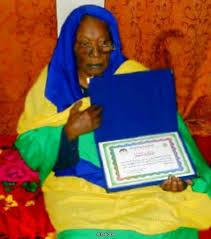Hawa Al-Tagtaga

Hawa al-Tagtaga | |
|---|---|
 | |
| Born | 1926 Al-Rahad, Sudan |
| Died | December 10, 2012 (aged 85–86) Omdurman, Sudan |
| Occupation(s) | Singer, poet, activist |
Hawa al-Tagtaga (alternatively Hawa Jah Elrasool, Arabic: حواء جاه الرسول, 1926 – 12 December 2012) was a Sudanese singer, composer and activist, who campaigned against British colonial rule. She was of Fulani and Hausa descent.
Biography
[edit]Al-Tagtaga was born in 1926 in El-Rahad, Abu-Dakna district in North Kordufan.[1] Her father was a Sufi mystic and her mother a poet.[2] From a young age, she wanted to be a singer, but her family were opposed to this and married her to a cousin, whom she later divorced so that she could follow a career in music.[3]
She moved to Khartoum when she was fourteen-years old and soon after her arrival her singing was in demand for wedding parties.[1] Her work developed into the wider role of the ghanaya - a woman who is responsible as a performer and singer for getting a bride ready for marriage, including teaching the bride to dance for the so-called henna party while also bathing and massaging them and passing on information about sexual relations.[3]
During World War II she sang to entertain Sudanese soldiers.[3] There are two rumours about why her name changed: One that she was given the nickname by British authorities, as she was demonstrating in every major town; the other that her voice was likened to a specific type of palm tree.[1]
Political life
[edit]Al-Tagtaga joined the popular struggle against British colonialism and was famous throughout Sudan for her political activism and singing.[1] She was a member of the Brothers Party, led by Ismail Al-Azari.[2] She was arrested by the British government on several occasions, as well as being shot at when Al-Azari raised the new Sudanese flag.[4] Along with Hasan Khalifa al-Atbarawi,[5] she was arrested on the eve of independence in 1956 for singing nationalist songs at the Labour Theatre in Atbara and jailed for three months.[6] Moreover, she had her front teeth knocked out by British troops whilst participating in a demonstration with the wife of Sudanese revolutionary Ali Abdel Latif.[5]
After Al-Azari's election, Al-Tagtaga wrote a new song praising his wisdom and education, but also teasing those who now regretted not having joined his movement:
"Those who denounced you, they regretted / You won the state election / God bless your ideas and thoughts / Which represent your knowledge and wisdom / You have skilfully won our independence/ from the greatest country [England]"[7]
Musical career
[edit]Being a well-known singer for weddings, she also sang for a variety of famous people, including Yasser Arafat, and performed at the wedding of King Farouk of Egypt and Narriman Sadek.[2] In later life, Al-Tagtaga was recorded singing on the television programme Names in our Lives.[8] She was an exponent of the important role television and radio could play in people's lives, particularly in bridging gaps between generations.[9]
Later life
[edit]Al-Tagtaga lived out her life in Omdurman, but she never married, choosing, as she said, a life as a singer.[3] As one of the last survivors of the revolution, she became a spokesperson for it, presenting television shows and receiving honours from Omar al-Bashir.[5] She died aged 86, on the 12 December 2012.[2]
Legacy
[edit]
Al-Tagtaga was a well-known figure, and was easily recognisable, as she often wore a tobe (Sudanese women's garment, similar to a sari) in the colours green, yellow and blue, which were the colours of the first Sudan flag of independence.[9] The flag was used from 1956 to 1970, but had a recent surge in popularity on social media in the 2019 revolution, with popular feeling wanting a new and more representative flag for the country.[10]
Al-Tagtaga's mixture of political song and protest has inspired new generations of women in Sudan. During the 2019 revolution, the civil rights campaigner Alaa Salah recited poetry in the front of a crowd of protesters in Sudan.[11] This marks a new chapter in a long tradition of Sudanese women singing poems of praise and lament in order to boost morale, honour the dead or to defy rulers.[6] Today, many women in Sudan see Al-Tagtaga as a feminist icon in their country, and there are more female singers, considered as "Hawa's girls" , following her lead and performing political songs in public.[5][12]
See also
[edit]References
[edit]- ^ a b c d "1st January Sudan National Day: Women Role In Independence Movement| Sudanow Magazine". sudanow-magazine.net. Retrieved 2019-12-16.
- ^ a b c d Chapel, Ambrose (2012-12-19). "Who Sudan Lost in 2012". Ola Diab. Retrieved 2019-12-16.
- ^ a b c d Malik, Saadia Izzeldin (2011). "Inside the lives of three Sudanese women performers: negotiating gender, the media and culture". Media, Culture & Society. 33 (2): 275–288. doi:10.1177/0163443710393385. ISSN 0163-4437.
- ^ Yaqub, Nadia; Quawas, Rula (2017-09-27). Bad Girls of the Arab World. University of Texas Press. ISBN 978-1-4773-1336-7.
- ^ a b c d "Sudan's Hawa: the banat come of age - Sudan Tribune: Plural news and views on Sudan". www.sudantribune.com. Retrieved 2019-12-16.
- ^ a b "Dehai News -- Aljazeera.com: The many mothers of Sudan's revolution". dehai.org. Retrieved 2019-12-16.
- ^ Muhammad, Baqie Badawi (1996). "The Role of Oral Poetry in Reshaping and Constructing Sudanese History" (PDF). Folklore Forum. 27: 63.
- ^ اسماء في حياتنا - حواء جاه الرسول ( حواء الطقطاقة ), retrieved 2019-12-16
- ^ a b "Hawa al-Tagtaga remembered". www.arabstodayen (in Arabic). Retrieved 2019-12-16.
- ^ "Au Soudan, les manifestantes crient " cette révolution est une révolution de femmes ! "". BEFORE CLASS (in French). 2019-03-22. Archived from the original on 2019-12-16. Retrieved 2019-12-16.
- ^ "The Many Mothers of Sudan's revolution". leadership.ng. Retrieved 2019-12-16.
- ^ "The Sudanese woman and the protest song". International Media Support. Retrieved 2021-01-30.